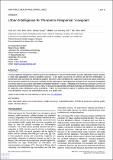Urban Intelligence for Pandemic Response: Viewpoint
Author(s)
Lai, Yuan; Yeung, Wesley; Celi, Leo Anthony
Downloaddocument.pdf (126.7Kb)
Publisher with Creative Commons License
Publisher with Creative Commons License
Creative Commons Attribution
Terms of use
Metadata
Show full item recordAbstract
Previous epidemic management research proves the importance of city-level information, but also highlights limited expertise in urban data applications during a pandemic outbreak. In this paper, we provide an overview of city-level information, in combination with analytical and operational capacity, that define urban intelligence for supporting response to disease outbreaks. We present five components (movement, facilities, people, information, and engagement) that have been previously investigated but remain siloed to successfully orchestrate an integrated pandemic response. Reflecting on the coronavirus disease (COVID-19) outbreak that was first identified in Wuhan, China, we discuss the opportunities, technical challenges, and foreseeable controversies for deploying urban intelligence during a pandemic. Finally, we emphasize the urgency of building urban intelligence through cross-disciplinary research and collaborative practice on a global scale. ©2020 Keywords: urban informatics; urban science; data science; health emergency; medical informatics; COVID-19; pandemic; outbreak; public health; infectious disease
Date issued
2020-04Department
Massachusetts Institute of Technology. Department of Urban Studies and PlanningJournal
JMIR Public Health and Surveillance
Citation
Lai, Yuan, Wesley Yeung, and Leo Anthony Celi, "Urban Intelligence for Pandemic Response: Viewpoint." JMIR Public Health and Surveillance 6, 2 (2020): no. e18873 doi 10.2196/18873 ©2020 Author(s)
Version: Final published version
ISSN
2369-2960